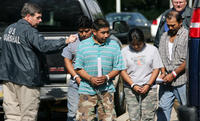-
U.S. to use more discretion applying terrorism-related inadmissibility immigration rules
The Obama administration has relaxed the rules for would-be asylum-seekers, refugees, and individuals who want to come to the United States or remain in the country despite their classification as having provided “limited material support” to terrorists or terrorist organizations.DHS says that rigorous s security and background checks will still be applied to asylum seekers, including those already in the United States, but officials will take into consideration“routine commercial transactions or routine social transactions,” Arab Spring-related anti-regime activities, and more. Current rules already allow exemptions for providing medical care to terrorists or acting under duress.As of 2011, 4,400 immigration cases are on hold as a result of the old terrorism-related inadmissibility rules.
-
-
Obama uses executive power to changes immigration policy

President Barack Obama is using executive power to tackle the country’s immigration issues while Congress makes little progress on immigration overhaul. The president issued executive orders prohibiting deportations of individuals who arrived in the United States illegally as children, individuals who care for children, and individuals who have no criminal records. Recently, some relatives of military service members living in the country illegally have been allowed to remain in the country as a way to lessen stress on the military and reward veterans.
-
-
Modernizing DHS border enforcement systems may cost more than $1.5 billion
TECS is the primary DHS system that Customs and Border Protection (CBP) personnel use to screen foreigners against a variety of watchlists, and it manages case files for Immigration and Customs Enforcement (ICE). ICE assignments tracked include money-laundering probes, online pornography investigations, and phone data analyses. A GAO audit last month found that the planned $1.5 billion upgrade to TECS now has no foreseeable end-date or final cost estimate.
-
-
U.S. defense industry pushes for immigration reform
CEO Linda Hudson of BAE Systemsis making a plea for immigration reform as she links the defense industry’s urgent need for skilled engineers to the push for the United States to develop a simpler path to citizenship for skilled and educated immigrants. She also says that “if we’re forced to forgo international talent we damn well ought to be doing something to produce that talent domestically.”
-
-
Local enforcement of immigration law does not achieve intended goals
A new study found that when local law enforcement agencies begin to inquire immigrants about their immigration status, some immigrants relocate within the United States but few go back relocate to their home country. Those who move to other states tend to be educated – and legally in the United States. The only exception is Arizona’s Maricopa County — which made a name for itself owing to Sheriff Joe Arpaio’s controversial approach to immigration policies — where immigrants are likely to leave the country, perhaps due to unusually intense enforcement and a short distance to the border.
-
-
Strike Two: The CBP’s failure to polygraph its future employees

Two recent reports – one by the DHS OIG, the other by the GAO — raise an alarm not just about CBP’s failure to monitor and ameliorate the use of excessive force by its agents and officers, but also call into question the quality and character of CBP’s current work force. Rather than reassure the public that the CBP is transitioning into a modern, professional law enforcement agency, these two reports highlight the need for increased congressional oversight and study of an agency which is so vital to our national security.
-
-
Decline in U.S. unauthorized immigrant population halted
The sharp decline in the U.S. population of unauthorized immigrants which accompanied the 2007-9 recession has bottomed out, and the number may be rising again. As of March 2012, 11.7 million unauthorized immigrants were living in the United States, according to a new report.
-
-
Gov. Jerry Brown: only U.S. citizens on juries
In recent days, Governor Jerry Brown of California approved bills allowing driver’s permits to illegal immigrants and allowing illegal immigrants with a law degree to practice law in the state. Yesterday, however, he drew a tight line around jury service by vetoing a bill which would have made it possible for legal immigrants who are not citizens to serve on juries.
-
-
House Dems propose comprehensive immigration bill
House Democrats last week released a proposed immigration bill aiming to tighten border security and provide a path to citizenship for millions of undocumented immigrants. The House Judiciary Committee has advanced several bills offering narrower changes to the current immigration law. It is not clear whether the rancor characterizing the budget debate would allow for a bipartisan consideration of either side’s immigration legislative preferences.
-
-
Immigration court cases in limbo during government shutdown
The shutdown of the U.S. federal government has left hundreds of thousands of immigration cases in limbo. Immigration lawyers note that it is likely that political asylum cases and deportation cases would be deemed non-urgent, and could thus be put off for months if the government shutdown continues. “Situations change. Memories fade. Evidence gets lost,” one immigration lawyer said. “If you have a court date now, and it is kicked off the calendar, it could be a matter of life and death.”
-
-
Texas draws more illegal immigrants, but overall numbers fall
Border Patrol numbers show that there has been a shift east in recent years in illegal immigration along the Southwest border, with more illegal crosser being apprehended in Texas at the same time that the overall numbers of illegal border crossers falling in other border states. Experts say that a combination of tougher law enforcement in Arizona, a strong Texas economy, and a greater number of Central American immigrants choosing the “relatively closer route” through Texas may be driving the shift.
-
-
California granting driver's licenses to illegal aliens threatens homeland security: critics
Last Thursday night’s approval of AB 60 by both houses of the California Legislature, granting driver’s licenses to illegal aliens, poses a serious threat to the security of all Americans, critics charge. The critics say that in 2005, in response to recommendations by the 9/11 Commission, Congress enacted the REAL ID Act in order to discourage state governments from issuing driver’s licenses and other identity documents to illegal aliens – and that California’s AB 60 is designed to circumvent requirements of REAL ID Act.
-
-
What you haven’t heard about immigration reform and border security

The Senate and House must find a way to resolve our current immigration dilemmas. We owe a fairer, more just system of laws to all our immigrants, both illegal and legal. And, yes, we must find ways to address issues of national security as well. It’s not going to be easy to shape such legislation, but we should demand no less from both Democrats and the Republicans.
-
-
Immigration reform bill would add 13,992 jobs per congressional district
The Senate’s immigration bill would add, on average, 13,992 new jobs in each congressional district in the United States over the next decade. This is one of the findings of an analysis offered by the conservative American Action Network (AAN). The group supports the reform of the U.S. immigration law and is active in the effort to persuade GOP House members to support the Senate immigration reform bill.
-
-
The administration does not follow its own deportation criteria

The Obama administration has set a record for deporting illegal immigrants, but the administration’s declared policy is to concentrate on criminals and other illegal immigrants who pose a risk. Yet, the administration has also been deporting immigrants who are not top priority according to the administration’s own criteria, and who may be eligible for legal residency if Congress reforms immigration law.
-
- All
- Regional
- Water
- Biometrics
- Borders/Immig
- Business
- Cybersecurity
- Detection
- Disasters
- Government
- Infrastructure
- International
- Public health
- Public Safety
- Communication interoperabillity
- Emergency services
- Emergency medical services
- Fire
- First response
- IEDs
- Law Enforcement
- Law Enforcement Technology
- Military technology
- Nonlethal weapons
- Nuclear weapons
- Personal protection equipment
- Police
- Notification /alert systems
- Situational awareness
- Weapons systems
- Sci-Tech
- Sector Reports
- Surveillance
- Transportation
Advertising & Marketing: advertise@newswirepubs.com
Editorial: editor@newswirepubs.com
General: info@newswirepubs.com
2010-2011 © News Wire Publications, LLC News Wire Publications, LLC
220 Old Country Road | Suite 200 | Mineola | New York | 11501
Permissions and Policies
Editorial: editor@newswirepubs.com
General: info@newswirepubs.com
2010-2011 © News Wire Publications, LLC News Wire Publications, LLC
220 Old Country Road | Suite 200 | Mineola | New York | 11501
Permissions and Policies
